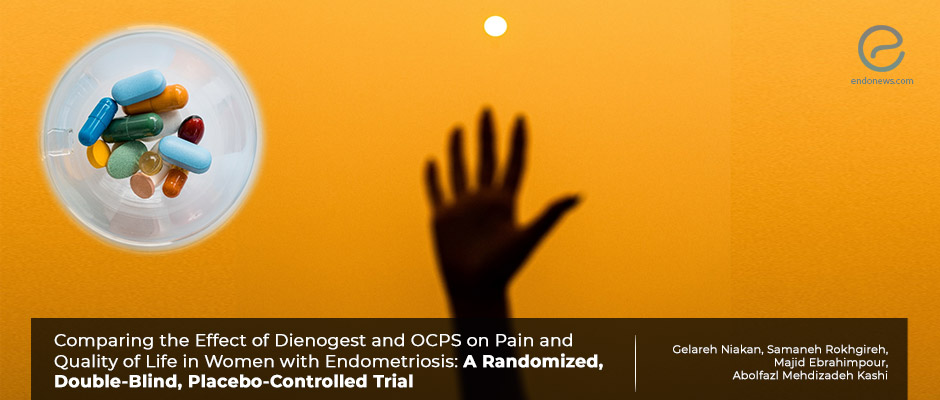Effects of Hormonal Contraceptives on Endometriosis Pain
Jan 14, 2022
Both dienogest and combined oral contraceptive pills can reduce endometriosis pain.
Key Points
Highlights:
- Both the oral progestin dienogest and the combined oral contraceptive pill can reduce pelvic pain and increase the quality of life in women with endometriosis.
Importance:
- This is the first randomized, double-blind, placebo-controlled clinal trial on the comparative effect of dienogest and a combined oral contraceptive pill on pain and quality life in patients with endometriosis.
What's done here:
- 90 women with severe endometriosis were treated with either dienogest, a combined oral contraceptive, or a placebo for 3 months.
- Their dyspareunia, dysuria, dyschezia, pelvic pain levels, and quality of life were then assessed.
Key results:
- Both treatments significantly reduced pelvic pain but had no effect on dysuria and dyschezia.
- Both treatments improved women’s quality of life but one was not better than the other.
Strengths and Limitations:
- The design of the study, being randomized, double-blind, placebo-controlled is its strength.
- Limitations are: data on important clinical outcomes were missing in some patients; patients not grouped based on disease stage or age, and short follow-up period.
Lay Summary
There is no difference between the oral progestin dienogest and combined oral contraceptive pills in managing pain and increasing quality of life in women with endometriosis, according to the results of a randomized, double-blind, placebo-controlled clinical trial. However, there was a significant difference between treated patients and those who received a placebo.
Combined oral contraceptive pills are readily used to manage the symptoms of endometriosis however, their effectiveness has not been thoroughly investigated.
Here, a team of researchers led by Dr. Abolfazl Mehdizadeh Kashi of the Endometriosis Research Center of Iran University of Medical Sciences in Tehran, Iran conducted a randomized double-blind clinical trial in 90 women with severe endometriosis whose disease was confirmed by laparoscopic surgery with the aim to compare the effect of dienogest and combined oral contraceptive pills on pain and quality of life.
Of the 90 women, 30 received 2 mg of dienogest, 30 received an oral contraceptive pill containing 30 μg Ethinyl estradiol and 0.3 mg of levonorgestrel, and 30 received a placebo once a day for three months.
The primary outcome measure of the study was patients’ pain including dyspareunia, dysuria, dyschezia, and pelvic pain. The secondary outcome measure was a change in patients' quality of life scores.
The results showed that treatment significantly reduced pelvic pain but had no significant effect on dysuria and dyschezia.
Moreover, treatment with both dienogest and the combined oral contraceptive pill significantly improved patients’ quality of life scores compared to placebo. However, there was no significant difference in scores between women receiving dienogest and those receiving the combined oral contraceptive pill.
The researchers concluded that both treatments are effective in reducing endometriosis-associated pain.
This interesting paper was recently published in the Archives of Iranian Medicine.
Research Source: https://pubmed.ncbi.nlm.nih.gov/34816682/
oral progestin dienogest combined oral contraceptive pill pelvic pain quality of life

